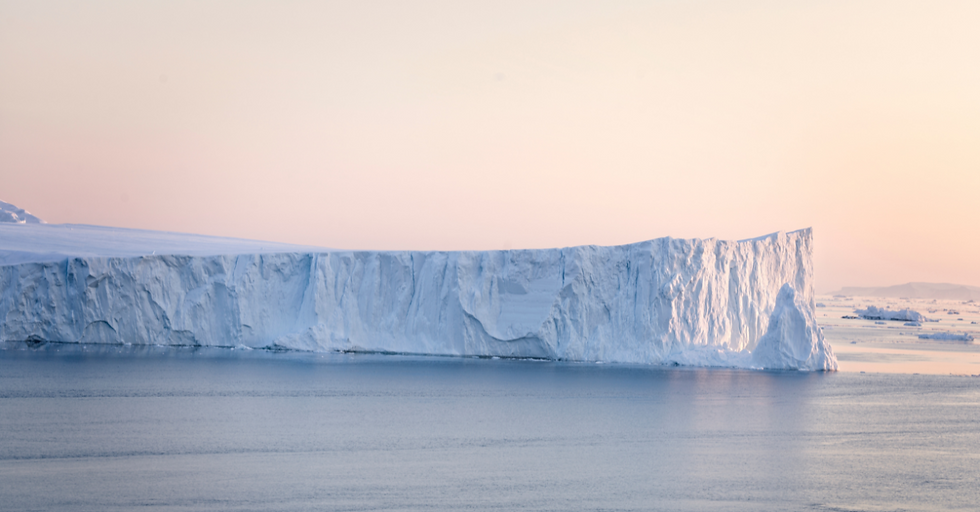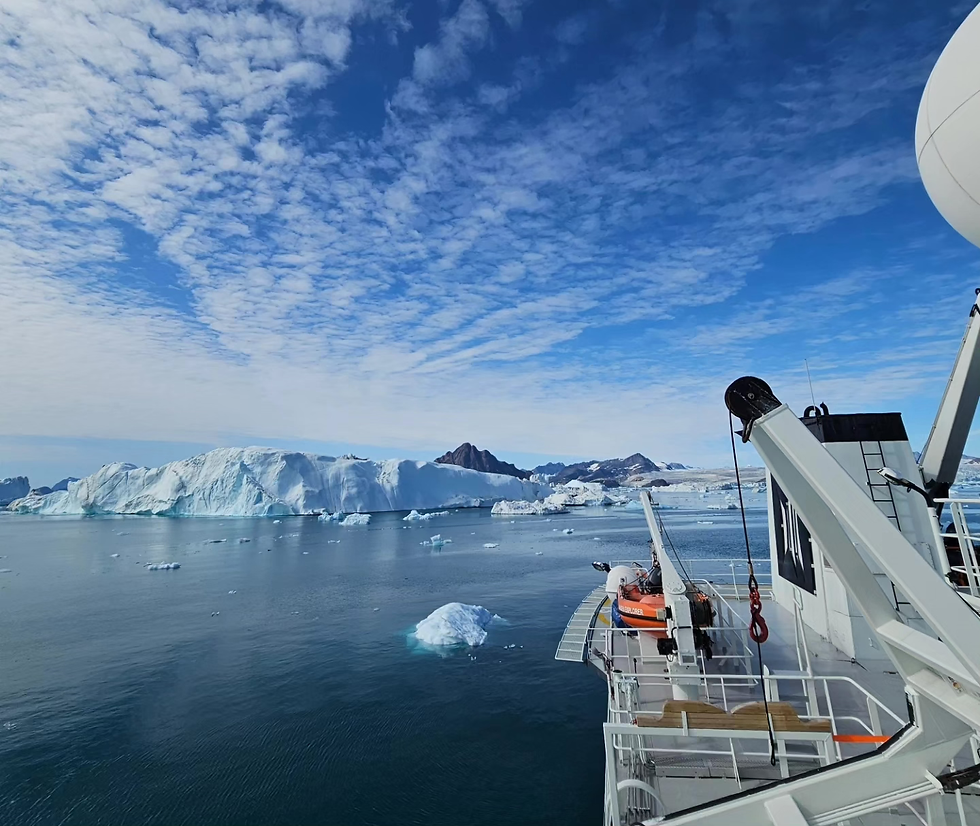- Lidija Jakovljevic

- Feb 1, 2024
- 6 min read
Updated: Oct 16
Captain Maiwenn Beadle's journey in the yachting world is far from ordinary. She made history by being the first woman to navigate a superyacht through the Northwest Passage, and the first female commercial master to accomplish this. The achievement places her in the company of only a handful of seafarers who have finished this challenging route since a Norwegian polar explorer Roald Amundsen first charted it over a century ago.
Maiwenn, known as the 'Accidental Ice Queen', is an explorer at heart. From navigating her yacht through the Bellot Strait's ice filled currents, to witnessing the Arctic's magical midnight colors, her expeditions are a blend of beauty and intense challenge.
Before going to sea, Maiwenn graduated as a fine artist and she spends her free time capturing the essence of yachts and the sea in her watercolor paintings.
1. What sparked your interest in focusing on off-the-beaten-track polar passages?
I think if you are naturally adventurous, then adventures find you. After I finished running Vesper, a 30M Frers Sailboat, I was eager to expand my knowledge of shiphandling and gain experience with larger vessels.
A Google search led me to Uncruise, a small passenger expedition company specialising in activity cruises. I started as a Second Officer, progressed to Chief Officer, and ultimately to the Captain position.
The adventure and scenery were incredible. Weekly trips navigating through icy waters towards the fronts of glaciers were addictive, and the wildlife was beyond comparison. I learned so much from the guides and other captains about how to locate whales and bears and how to craft an adventure that was safe yet felt like exploring the unknown.

2. Navigating arctic areas comes with its own set of challenges. What are some of the key considerations when preparing for such a voyage?
There is not much on the charts, pilot book information is scarce and self sufficiency is key. You'll find yourself in remote areas, far from any support services, where assistance is not readily available. Your vessel needs to be well-maintained and in excellent condition.
Your crew should be prepared to operate far beyond their normal comfort zones and having good back-up plans is key. Equally crucial is the presence of dependable engineers and a supply of necessary spare parts. The journey demands a crew that's not only skilled but also supportive and caring towards each other, enhancing the collective experience.
3. For yacht crew aspiring to join yachts that navigate the polar regions, what are the crucial factors they should be aware of or be prepared for?
The mesmerising beauty of the light conditions of the Arctic, the magic of its wildlife and the incredible geology laid bare are captivating. It's a place to which I am completely addicted and find myself constantly longing to return.
However, it can also be a challenging environment. The stark and austere landscape can evoke strong emotions and discomfort. The sheer vastness can be overwhelming. The perpetual daylight can lead to fatigue.
Hours are long, safe anchorages are sparse and often crowded with drifting icebergs. The sound of navigating through ice can be unsettling. Crew members often feel isolated, far removed from familiar comforts like bars, friends, and family, making a single journey sufficient for many.

4. With increasing intrigue among yacht owners to venture into polar regions, what do you believe drives their interest in these remote areas? Should we be seeing more yacht captains pursuing their polar code certification?
The polar regions have an otherworldly nature, something impossible to find anywhere else. There is a magic and a mystery to them, and a strong sense of being untouched. There is undoubtedly a rapidly growing interest in the area.
Should more captains be pursuing Polar Qualifications? It is always beneficial to have a thorough understanding and education about the areas to be visited. Understanding the rules specific to these fragile environments is critical.
Achieving Polar Advanced qualifications requires 60 days of navigating in polar waters, which isn’t always easy to accomplish. The use of experienced Ice Advisors like me aboard is often required by insurance, and it is something I highly recommend. Much in Arctic waters is alien to us, and having someone with specific knowledge of the area aboard takes a lot of the strain and guesswork out of the equation.

5. Arctic areas must offer some amazing wildlife. What were some of your memorable animal encounters?
So many moments to choose from, but one stands out. It was towards the end of my first trip to the Northwest Passage, and for days people kept asking me when we would see some narwhals. Now, narwhals are elusive and often hard to positively identify from a boat.
As we were cruising, searching for narwhals and polar bears, we encountered 13 polar bears in just one day. We saw bears swimming, bears with cubs, bears eating a seal, and even a bear feasting on a baby bowhead whale, while other bowhead whales watched. To say it was epic doesn't even come close. But still, no narwhals.
That night, while talking to my partner via video chat, I was a bit stressed about not having seen any narwhals despite the amazing day. He jokingly reassured me: 'Don’t worry, love, you will find them tomorrow, and when you do, they will be singing.' His words made me laugh and eased my stress.
The next day, with only one day left and still no clear idea of how to find the narwhals, I playfully offered $100 to the first crew member to spot one. I had just sat down for lunch when the crew mess phone rang. 'Captain to the bridge, please.'
And there they were, a few hundred narwhals between us and the shore, these elusive sea unicorns. We carefully followed them at a distance of 2/10 of a mile. As they swam closer to the shore and the water shallowed, we pulled back the throttle and stopped the engine. Suddenly, my Mate appeared and urged, 'You have to come listen.'
I stepped out onto the Portuguese Bridge, and there it was – the sound of Narwhals singing.

6. Operating in such pristine environments must come with a heightened sense of environmental responsibility. How do you ensure that your voyages are sustainable and respectful to the ecosystems you explore?
In the Arctic, a footprint can linger indefinitely. This is due to the region's minimal precipitation, lack of vegetation and minimal microbial activity that would typically break down soil.
The Arctic is essentially a very cold desert, remaining dark and frozen for half the year. Consequently, where you walk, your activities and your interactions with nature must all be thoughtfully considered.
Rapid-fire Questions:
Most essential item on a polar voyage?
A sense of humor, and always keep a Muskox wool knit hat and buff tucked in your pocket. A knit hat made from muskox would provide exceptional warmth, which is essential in polar conditions.
Roughest sea you’ve navigated?
Navigating around the Falkland Islands and Cape Horn was incredibly challenging due to the consistently huge seas. This experience, many years ago in a 60ft sailboat, was particularly intense. We faced winds over 80 knots and enormous seas. We were knocked down, with our masthead in the water, and lost all our communications. I remember making a few deals with God that night.
One piece of advice for aspiring polar captains?
Polar regions are no place for mere confidence; they demand knowledge. My advice is to learn from someone with true experience in these areas.
Most surprising thing you’ve seen in icy waters?
There have been so many astonishing sights. I've seen a glacier eject a geyser of Pepto Bismol pink water 50 feet into the air, watched narwhals herding fish against an iceberg to feed, and witnessed the entire side of a quarter-mile-long iceberg breaking off. I've seen the sea freeze around us like a slurpee, a torrent of ice moving at 8 knots through the Bellot Strait, and even a small fiberglass Inuit boat at 78°N in very heavy ice – a family inside, with a toddler in a beanie with bunny ears, when we thought we were completely alone.
The quality you most value in your crew?
Kindness and consideration for each other, and that sense of humor.
Your go-to meal after a day in freezing temperatures?
Whatever is on the table. Never upset the chef when you wont be leaving the boat for 3 months.
Dawn or dusk at sea?
When you go far enough north they are the same thing .
The person who inspired your career the most?
One of the most inspiring figures in my career has been Tony Lancaster, a Royal Marine officer I hired to teach us about Polar Bear Safety. Tony had rowed a 14ft open boat through the Northwest Passage. His first words to me were, 'Tell me all about your crew, as I always find there's someone in the room with a more interesting story than I have.' This humility, combined with his tales of adventure – almost being eaten by a bear, facing extreme weather, and getting stuck in the ice – not only captivated us but also imparted a leadership lesson I've never forgotten.
To follow more of Captain Maiwenn's adventures, you can follow her accounts:
Instagram: @theaccidentalicequeen
Maiwenn's Polar Advisor Website: Unicorn Arctic Consultancy
Maiwenn's Art Paintings: Maiwenn Beadle Marine Artist


















.jpg)